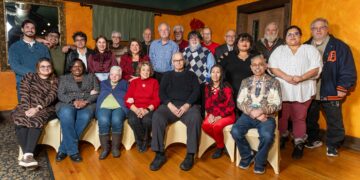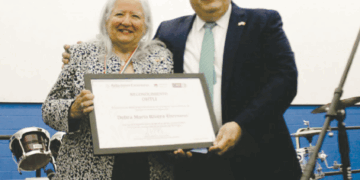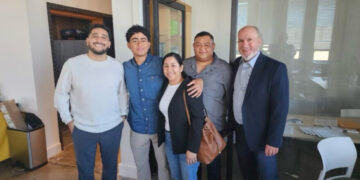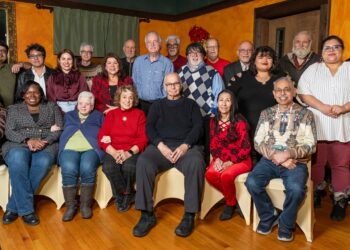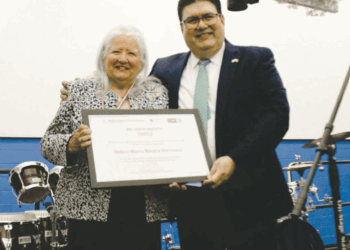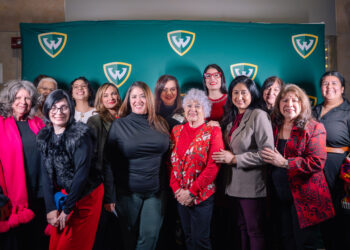People interested in working behind the scenes in Detroit’s entertainment industry learned about real job opportunities at a Michigan Production Alliance and Michigan Film Industry Association event held at Candela Detroit last Thursday, November 20th. Jason Rogers has worked as a sound engineer in Detroit for 25 years and explained how to break into the business, and what makes Detroit crews special.
Rogers works at some of Detroit’s biggest venues, including Little Caesars Arena and Fox Theatre, and is the Front-of-House Sound Engineer at the Aretha Franklin Amphitheatre. He hears the same feedback from touring professionals again and again—they love working with Detroit crews. “Touring engineers are telling us they love our workers. Detroit has one of the best crews around,” Rogers said. At LCA, crews can unload 27 trucks of concert gear in five hours. Other cities need more than 20 hours for the same work.
The presentation gave attendees specific ways to get started in production work, with Rogers saying that Christian churches offer some of the best training for young people learning audio engineering. Other options include working at local venues and getting certified online through programs like Dante digital audio networking. “We’re always short staffed, always looking for people,” Rogers explained, pointing out that about 90 percent of people he’s trained at Aretha Franklin now work on tours with famous artists.
Detroit’s entertainment scene is growing, too, which is creating job openings for trained crew members, but it’s not work that can be learned overnight. Rogers explained that it takes around five years before someone feels confident enough to handle sound for a show on their own. During those learning years, workers memorize which cables connect different gear, practice fixing problems on the spot, and learn why the Fox Theatre might sound nothing like LCA.
As industry equipment gets more sophisticated, crew members have to train continuously to stay competitive. Rogers had spent nine hours in Chicago learning a new system worth over $100,000 just one day before the MPA-MIFIA event. “The in-ear monitors now are going to be 3D. They’re going to make it so the snare drum is going to be here, moving around with the stage,” Rogers explained. “All this technology, which is pretty amazing, is all coming up.”
The Michigan Production Alliance and Michigan Film Industry Association host free training events throughout the year. Their next gathering is the 36th Annual Freelancers Ball on December 18 at Fifth Avenue in Royal Oak. Anyone interested can find MPA on social media or Groups.io to learn about training opportunities and jobs in Michigan’s growing entertainment industry.
This article and photos were made possible thanks to a generous grant to EL CENTRAL Hispanic News by Press Forward, the national movement to strengthen communities by reinvigorating local news. Learn more at www.pressforward.news.
Ingeniero de Sonido Revela lo que Realmente Toma Empezar en la Producción en Vivo
Las personas interesadas en trabajar “detrás del telón” en la industria del entretenimiento de Detroit conocieron oportunidades reales de empleo durante un evento organizado por Michigan Production Alliance y Michigan Film Industry Association en Candela Detroit el jueves 20 de noviembre. Jason Rogers, ingeniero de sonido con 25 años de experiencia en la ciudad, explicó cómo entrar al negocio y qué vuelve tan especiales a las equipos técnicos de Detroit.
Rogers trabaja en algunos de los recintos más grandes de Detroit, como Little Caesars Arena y Fox Theatre, y es el Front-of-House Sound Engineer en el Aretha Franklin Amphitheatre. Escucha los mismos comentarios de los profesionales en gira una y otra vez: les encanta trabajar con los equipos de Detroit. “Los ingenieros de gira nos dicen que aman a nuestra gente. Detroit tiene una de las mejores equipos técnicos del país”, dijo Rogers. En LCA, los equipos pueden descargar 27 camiones de equipo de concierto en cinco horas. En otras ciudades, ese mismo trabajo puede tomar más de 20 horas.
La presentación ofreció a los asistentes formas concretas de empezar en el campo de producción. Rogers señaló que muchas iglesias cristianas brindan una de las mejores formaciones para jóvenes que quieren aprender ingeniería de audio. Otras opciones incluyen trabajar en recintos locales y obtener certificaciones en línea a través de programas como Dante digital audio networking. “Siempre estamos cortos de personal, siempre buscando gente”, explicó Rogers, resaltando que alrededor del 90 por ciento de las personas que ha entrenado en Aretha Franklin ahora trabajan en giras con artistas reconocidos.
La escena de entretenimiento en Detroit también está creciendo, lo que genera nuevas oportunidades para miembros de cuadrillas capacitados, pero no es un trabajo que se aprenda de la noche a la mañana. Rogers explicó que toma unos cinco años para que alguien se sienta con la confianza suficiente para manejar el sonido de un show por su cuenta. Durante esos años de aprendizaje, los trabajadores memorizan qué cables conectan cada equipo, practican cómo resolver problemas al instante y aprenden por qué el Fox Theatre no suena nada parecido a LCA.
A medida que el equipo de la industria se vuelve más sofisticado, los miembros de las cuadrillas tienen que entrenarse constantemente para mantenerse competitivos. Rogers había pasado nueve horas en Chicago aprendiendo un sistema nuevo valorado en más de $100,000 apenas un día antes del evento de MPA-MIFIA. “Los in-ear monitors ahora van a ser 3D. Van a hacer que la tarola suene aquí, moviéndose junto con el escenario”, explicó Rogers. “Toda esta tecnología, que está increíble, ya viene en camino.”
Michigan Production Alliance y Michigan Film Industry Association organizan eventos gratuitos de capacitación durante todo el año. Su próxima reunión será el 36th Annual Freelancers Ball el 18 de diciembre en Fifth Avenue en Royal Oak. Las personas interesadas pueden encontrar a MPA en redes sociales o en Groups.io para conocer más oportunidades de entrenamiento y empleo en la creciente industria del entretenimiento en Michigan.


